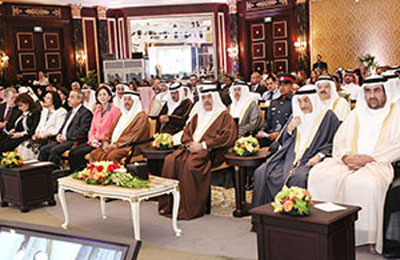
Shaikh Ali with ministers, top UN executives and other dignitaries during
the opening of the forum
Mideast conflicts 'pose risk to regional growth'
MANAMA, May 6, 2015
Ongoing conflicts in the Middle East pose a serious risk to sustainable development across the Arab region, a high-level conference in Bahrain heard yesterday (May 5).
An expert warned that millions of displaced families seeking shelter in Arab and GCC countries have led to problems accommodating refugees, unemployment and other societal issues, said a report in the Gulf Daily News (GDN), our sister publication.
That was just one of the issues highlighted at the Arab High-Level Forum on Sustainable Development by United Nations Economic and Social Commission for Western Asia (ESCWA) Under-Secretary General and executive secretary Rima Khalaf.
"The Arab region is facing several issues especially with the ongoing conflicts that have led to the problem of refugees, unemployment and other societal issues," said Khalaf.
"Conflicts directly affect sustainable development and at the same time countries in this region are fighting extremism and terrorism."
She was speaking during the event at the Ritz-Carlton Bahrain, Hotel and Spa, which continues until tomorrow under the patronage of His Royal Highness Prime Minister Prince Khalifa bin Salman Al Khalifa.
It is organised by the ESCWA and the United Nations Environment Programme (UNEP) in collaboration with the Arab League.
Deputy Prime Minister Shaikh Ali bin Khalifa Al Khalifa was delegated to attend the opening session and he highlighted Bahrain's achievement in becoming one of the first countries to meet most Millennium Development Goals (MDGs) ahead of schedule - in terms of providing free education, female empowerment, gender equality, expansion of social welfare and enhanced standards of healthcare.
"Bahrain has occupied an outstanding position for many consecutive years in the United Nations human and sustainable development reports, as well as those issued by specialised institutions," said Shaikh Ali.
He urged forum participants to study the possibility of developing a "unified Arab system" that could ensure security and stability in the region, elevate living conditions and cement its ability to face political, security and economic challenges.
Meanwhile, UN Assistant Secretary General and UNEP deputy executive director Ibrahim Thiaw said the world was changing at an unprecedented pace and the Arab region was no exception.
"In this region there is an added burden of conflict, creating additional sustainable development challenges and seeing many (refugees) in total desperation risking their lives by crossing the Mediterranean in search of a better future," he said.
Thiaw told delegates that up to 90 per cent of wastewater in developing countries went untreated into rivers and lakes, threatening health and food security.
"As a consequence, up to six hospital beds out of 10 are filled with people affected by water-related diseases," he revealed.
He also blamed sand and dust storms in the Arab region on fluctuating climate conditions that called for a focus on renewable energy, energy efficiency, sustainable transport and water security.
However, UNEP regional director for Arab states Dr Sima Bahous said there could be no development in the Arab region in the face of so much conflict.
"Without peace we cannot talk about development, let alone sustainability," said Dr Bahous.
More than 200 delegates, including several from different UN agencies, are attending the event to discuss issues such as youth unemployment, climate change, building resilient economies and promoting peaceful societies.
The first session yesterday on MDGs and sustainable development in the Arab region featured UN experts and was moderated by Social Development Minister Faeqa Al Saleh.
A second session moderated by Jordan's Environment Minister Taher Al Shakhshir focused on the post-2015 development agenda, while parallel events discussed food and nutrition security in the Arab world.
The region's high dependency on food imports, which the UN says account for more than 50pc of Arab countries' calorie intake, was also highlighted.
"Many Middle East and North African countries have made it to the world's list of countries with the highest rates of obesity in the world, yet many others figure among the countries with the highest incidence of stunting among children," said Food and Agriculture Organisation assistant director-general Abdessalam Ould Ahmed.
The forum continues today with a focus on financing sustainable development in the Arab region, water scarcity, the green economy, disaster risk reduction and the use of Information and Communication Technology in environmental protection.
A list of recommendations for regional governments will be issued at the end of the forum. - TradeArabia News Service







